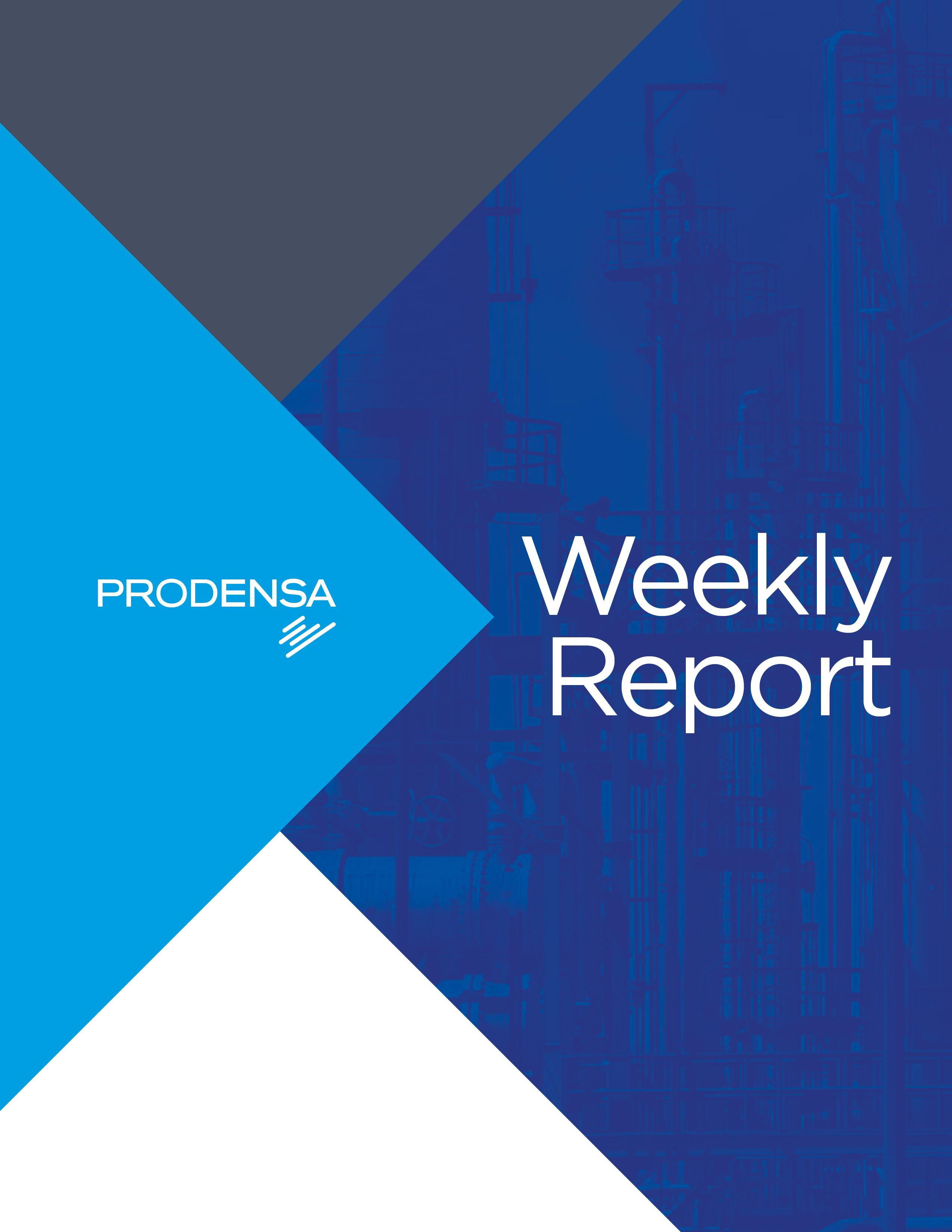
March 15-21, 2025



March 15-21, 2025

Emilio Cadena, president of Prodensa, stated that if the U.S. maintains tariff exemptions under the USMCA, companies not yet complying would need 6 to 12 months to adapt Shifting suppliers is complex and requires investment in infrastructure, as well as ensuring sufficient factories, machinery, and workforce
According to the Cato Institute, 40% of exports to the U.S. would need to transition from Most Favored Nation (MFN) status to avoid a 25% tariff imposed on March 4. This shift affects multiple sectors, including aerospace, medical devices, and capital goods, beyond the automotive industry The uncertainty surrounding the U S decision on April 2 is delaying investment projects, with 30% of Prodensa’s clients putting plans on hold, particularly Chinese investors. While Cadena sees short-term uncertainty, he remains optimistic in the medium term, given Mexico’s growing importance in U S supply chains
Source: REFORMA

Marcelo Ebrard, Mexico’s Secretary of Economy, traveled to Washington for the fourth time this thursday to negotiate with the U S government the suspension of 25% tariffs on Mexican products, set to take effect on April 2. Mexico has already secured two temporary suspensions, but economic uncertainty persists. Organizations like the OECD predict a 1.3% contraction in Mexico’s GDP in 2025 due to tariff policies and slowing investment Exports to the U S , accounting for nearly 30% of Mexico’s GDP, are at risk, impacting key sectors such as automotive and manufacturing.
Fitch has downgraded its growth projection to 0%, and inflation is expected to remain above 3%, complicating economic recovery Additionally, foreign investment could decline due to trade uncertainty, affecting employment and small businesses. While President Claudia Sheinbaum’s administration seeks to diversify trade partners, the U S remains Mexico’s dominant market A possible alternative scenario, where tariff exemptions under the USMCA agreement are maintained, could prevent a severe recession, with marginal growth of 0.1% in 2025 and 0.8% in 2026. However, the lack of clarity regarding the final stance of the Trump administration complicates Mexico’s economic strategy
Source: FRANCE 24

The Trump administration’s restructuring of USAID and a 90-day funding freeze have significantly impacted Mexico’s refugee support and civil society programs Mexico’s refugee agency (Comar) and NGOs like Casa Frida, which aids LGBT+ refugees, face funding shortages, jeopardizing essential services. USAID previously invested $99 million in human rights, rule of law, and anti-corruption initiatives, now disrupted While Secretary of State Marco Rubio suggests some programs may resume, staff layoffs and lost institutional memory threaten long-term effectiveness. These cuts risk weakening Mexico’s humanitarian and governance efforts.
Source: EL PAÍS
On March 20, 2025, Mexico’s Chamber of Deputies approved the dissolution of the National Institute for Transparency, Access to Information, and Personal Data Protection (INAI), replacing it with "Transparencia para el Pueblo," under the Secretariat of Anti-Corruption and Good Governance The reform, led by President Claudia Sheinbaum’s administration and supported by the ruling Morena party, establishes new transparency laws and reassigns INAI’s functions to government-controlled bodies. Now it’s a matter of hours before its announced demise is consummated, so this Tuesday the final session of the advisory council will be held before the Mexican Congress approves the secondary laws of the constitutional reform that force its demise and create a new entity christened Transparency for the People.
Critics argue this change undermines transparency by eliminating an autonomous oversight body, making the government both regulator and subject of transparency requests. The reform increases the number of cases in which information can be classified as reserved from 13 to 17 including national security and public safety concerns Moreover, key government projects will be shielded from disclosure
Implications for Mexico include reduced investor confidence, as transparency and accountability weaken, increasing risks of corruption The shift may also deter foreign direct investment by raising concerns over government opacity
Source: ANIMAL POLÍTICO

Mexico’s National Electoral Institute (INE) will install special polling stations for the 2025 Judicial Election, ensuring citizens in transit can vote. The election, set for June 1, will appoint judges, magistrates, and Supreme Court ministers This election raises concerns about political stability and transparency, impacting investor confidence A well-organized process could strengthen Mexico’s democratic institutions, reassuring investors. However, political uncertainty surrounding judicial appointments may create hesitancy, affecting long-term investment decisions and economic growth Stability and rule of law remain key factors for economic confidence
Source: EL ECONOMISTA

BYD’s plans to build a $1 billion plant in Mexico face uncertainty as China delays approval, fearing U S access to its electric vehicle technology Despite BYD's initial announcement in 2023, President Claudia Sheinbaum stated that the investment was never formal. The delay comes amid escalating U.S.-China trade tensions and Trump's impending 25% tariffs on Mexican exports. Mexico prioritizes compliance with the USMCA, seeking cautious dialogue with the U S while reducing reliance on Chinese imports This situation tests Mexico’s balancing act between attracting foreign investment and maintaining favorable trade relations with the U S
Source: FORBES MÉXICO
President Claudia Sheinbaum signed a decree issuing secondary energy laws to restore Pemex and CFE as state-owned enterprises, reversing privatization efforts from the 2013 reform The legislation, published in the Diario Oficial de la Federación, includes eight new laws and reforms to existing ones Sheinbaum highlighted this as a tribute to Lázaro Cárdenas and Mexico’s sovereignty Critics argue Pemex remains inefficient and in debt, warning that state control could worsen its crisis
Source: GOBIERNO DE MÉXICO

Initiative with Draft Decree to Reform and Add Various Provisions to the Federal Labor Law
Presented by: Sen. Amalia Dolores García Medina (LNal - MC) (View profile of the actor)
Objective: To include workplace cyberbullying as grounds for terminating the employment relationship without liability for either the employer or employee, depending on the offender. Employers will be required to implement protocols to prevent and address cyberbullying, with penalties for violators
Status: 2025-03-20 - Published in the Parliamentary Gazette
Initiative with Draft Decree to Add Section VI) and Amend the Subsequent Section of Article 74 of the Federal Labor Law Regarding Mandatory Rest Days
Presented by: Sen Juan Carlos Loera De la Rosa (Chih - MORENA) (View profile of the actor)
Objective: To establish November 2nd of each year as a mandatory rest day
Status: 2025-03-19 - Published in the Parliamentary Gazette
Initiative with DraftDecree to Reform Article 63 of the Federal Labor Law
Presented by: Sen Julieta Andrea Ramírez Padilla (BC - MORENA) (View profile of the actor)
Objective: To establish that employees will be granted at least one hour of rest during continuous work shifts
Status: 2025-03-19 - Published in the Parliamentary Gazette
Draft Initiative to Reform and Add Various Provisions of the Federal Labor Law on Salary Transparency
Presented by: Deputy Mirna María de la Luz Rubio Sánchez (Hgo - MORENA) (View actor profile)
Objective: To ensure salary transparency by prohibiting clauses that limit workers' access to salary criteria, requiring employers to disclose pay scales, and mandating the creation of mixed salary transparency committees in companies with over 50 employees Employers must guarantee equal pay for equal work and prevent retaliation against employees seeking pay equity.
Status: 2025-03-19 - Published in the Parliamentary Gazette
Initiative with Draft Decree to Add a Fourth Paragraph to Article 5 of the Law on Protection and Defense of Financial Service Users
Presented by: Sen Luisa Cortés García (Oax - MORENA) (View profile of the actor)
Objective: To require financial institutions to provide preferential service to elderly individuals, people with disabilities, or those in a bedridden state, establishing alternative, effective, and efficient service mechanisms that ensure the health of users, especially when they are unable to travel to the institution's physical location
Status: 2025-03-19 - Published in the Parliamentary Gazette
Declaration of Publicity of the Opinion with Draft Decree to Reform the Tenth Paragraph of Article 25 and Section XXIX-Y of Article 73 of the Political Constitution of the United Mexican States, Regarding Administrative Simplification and Digitization
Presented by: Constitutional Points (View composition)
Objective: To require all levels of government to implement public policies for administrative simplification and digitization of procedures and services, regulatory best practices, and the development of public technological capacities It authorizes Congress to issue a national law establishing principles and obligations for these areas
Status: 2025-03-19 - Published in the Parliamentary Gazette
Initiative with Draft Decree to Reform, Add, and Repeal Various Provisions of the Public Works and Related Services Law
Presented by: Federal Executive
Objective: To create the Digital Public Procurement Platform aimed at automating the entire public procurement process for greater speed and transparency It introduces new contracting strategies, including strategic dialogues, market research, social witnesses, and tighter regulations to prevent conflicts of interest and monopolistic practices It also establishes legal measures to enforce compliance and extend sanctions
Status: 2025-03-13 - Published in the Parliamentary Gazette
